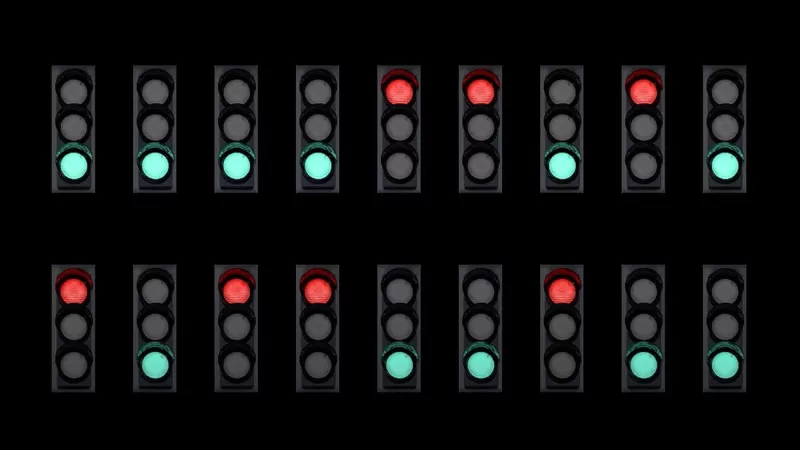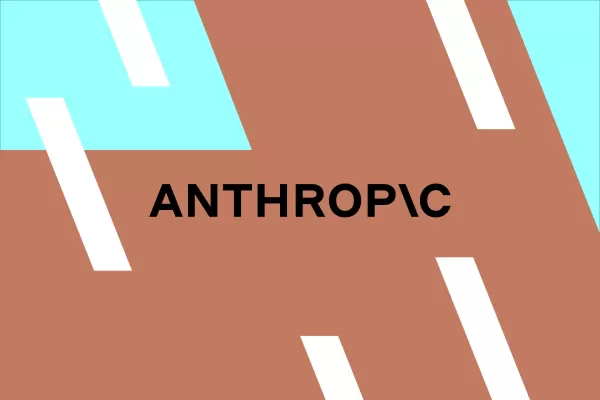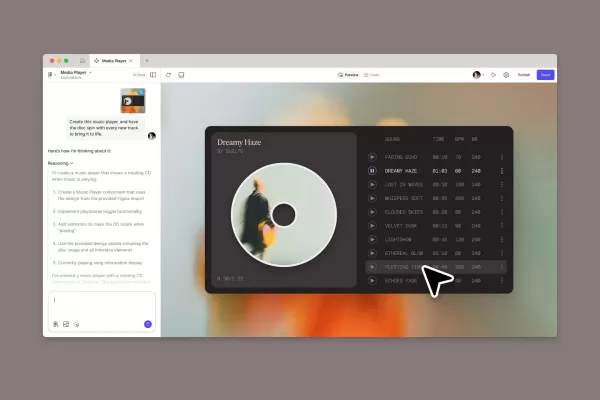Google's AI Reduces Traffic, Cuts Emissions

At the beginning of 2020, a group of researchers at Google Research embarked on a mission to find innovative ways to combat climate change. "We explored a variety of big ideas, ranging from cultivated meat to energy solutions and air pollution reduction," explains Dotan Emanuel, a software engineer involved in the project.
During a family dinner, Dotan shared these ambitious ideas, and the discussion quickly shifted to a common grievance: traffic lights. "My wife Osnat suggested, 'Why not focus on traffic lights? We often wait at them unnecessarily,'" Dotan recalls.
Road transportation significantly contributes to global and urban greenhouse gas emissions, particularly at city intersections where pollution levels can spike to 29 times higher than on open roads. Approximately half of these emissions are due to vehicles accelerating after stopping. With millions of traffic lights worldwide, the potential for impact was enormous.
Initially skeptical, Dotan thought, "We can’t do anything about traffic lights." Yet, he realized that the most intriguing research challenges often lie in unexplored territories.
Fueled by curiosity, Dotan and his team delved into traffic engineering. They discovered that while some stop-and-go traffic is inevitable, much of it could be mitigated through better timing of traffic lights. Traditionally, cities either had to invest in costly hardware or conduct labor-intensive vehicle counts to optimize traffic flow, methods that often fell short of providing comprehensive data.
"We realized we had a unique asset at our disposal—over a decade of Google Maps driving trends from around the world," Dotan notes. Within weeks, they crafted a project proposal.
This led to the birth of Project Green Light, an initiative that leverages AI to suggest optimizations for existing traffic lights, aiming to reduce emissions from stop-and-go traffic. After reviewing numerous proposals, Green Light was selected for its straightforward approach, scalability, and potential impact.
The Green Light team harnessed Google Maps' driving data to develop an AI model that analyzes traffic flow at intersections, including patterns of stopping and starting, average wait times, and the synchronization between nearby intersections. The model proposes adjustments, such as reducing red light durations during off-peak times or better coordinating unsynchronized intersections. City engineers can review and implement these suggestions quickly using existing infrastructure.
"Our goal is to deploy effective Green Light recommendations globally and scale rapidly," says Alon Harris, the Green Light Program Manager. "We've designed the system to be simple and lightweight, so cities don't need to invest in additional software or hardware. We provide the recommendations, and the cities decide on the action."
Since its initial pilot in 2021, the team has expanded testing to numerous intersections, refined their predictions, and brought Green Light to over a dozen cities worldwide, including Rio de Janeiro, Seattle, Bengaluru, and most recently, Boston. They've also created a comprehensive dashboard to share recommendations and analytics with partner cities, continually updating it to reflect new developments.
The Green Light dashboard offers city-specific actionable insights and supporting data. After implementing a recommendation, the dashboard provides an impact analysis report.
"We provide each city with detailed reports showcasing tangible results, like the number of stops avoided at an intersection over time," Alon explains. "This encourages not only the initial adoption of our recommendations but also their broader application to more intersections."
Currently, Green Light is operational at over 70 intersections, contributing to fuel savings and reduced emissions for up to 30 million car rides each month. Initial data suggests a potential reduction in stops by up to 30% and a decrease in intersection emissions by up to 10%.
The team aims to expand Green Light to hundreds of cities and tens of thousands of intersections in the coming years. Along this journey to improve the world, they hope to bring more joy by reducing the frustration of stop-and-go traffic.
"You know that feeling when you drive through five consecutive green lights and it feels like your lucky day?" Dotan reflects. "We want to make that experience more common for people everywhere."
Related article
 "Dot AI Companion App Announces Closure, Discontinues Personalized Service"
Dot, an AI companion application designed to function as a personal friend and confidant, will cease operations, according to a Friday announcement from its developers. New Computer, the startup behind Dot, stated on its website that the service will
"Dot AI Companion App Announces Closure, Discontinues Personalized Service"
Dot, an AI companion application designed to function as a personal friend and confidant, will cease operations, according to a Friday announcement from its developers. New Computer, the startup behind Dot, stated on its website that the service will
 Anthropic Resolves Legal Case Over AI-Generated Book Piracy
Anthropic has reached a resolution in a significant copyright dispute with US authors, agreeing to a proposed class action settlement that avoids a potentially costly trial. The agreement, filed in court documents this Tuesday, stems from allegations
Anthropic Resolves Legal Case Over AI-Generated Book Piracy
Anthropic has reached a resolution in a significant copyright dispute with US authors, agreeing to a proposed class action settlement that avoids a potentially costly trial. The agreement, filed in court documents this Tuesday, stems from allegations
 Figma Releases AI-Powered App Builder Tool to All Users
Figma Make, the innovative prompt-to-app development platform unveiled earlier this year, has officially exited beta and rolled out to all users. This groundbreaking tool joins the ranks of AI-powered coding assistants like Google's Gemini Code Assis
Comments (26)
0/200
Figma Releases AI-Powered App Builder Tool to All Users
Figma Make, the innovative prompt-to-app development platform unveiled earlier this year, has officially exited beta and rolled out to all users. This groundbreaking tool joins the ranks of AI-powered coding assistants like Google's Gemini Code Assis
Comments (26)
0/200
![StevenWalker]() StevenWalker
StevenWalker
 October 2, 2025 at 12:30:38 AM EDT
October 2, 2025 at 12:30:38 AM EDT
Google снова удивляет! Их ИИ реально помогает уменьшить пробки и выбросы — это круто. Хотя я до сих пор не понимаю, как алгоритм предсказывает трафик точнее людей 😅 Может быть, скоро все СИМ-карты будут подключены к их системе и пробок вообще не станет?


 0
0
![DonaldAdams]() DonaldAdams
DonaldAdams
 September 20, 2025 at 6:30:38 AM EDT
September 20, 2025 at 6:30:38 AM EDT
Google用AI減緩塞車的點子很棒,但台北的摩托車海不知道適不適用這套系統?🤔 每次騎車都覺得交通規則只是參考用...


 0
0
![GeorgeTaylor]() GeorgeTaylor
GeorgeTaylor
 September 15, 2025 at 8:30:35 AM EDT
September 15, 2025 at 8:30:35 AM EDT
Sempre bom ver gigantes tech usando IA pra ajudar o meio ambiente! Mas será que essas reduções de tráfego não vão acabar criando mais congestionamentos em outras áreas? 🤔 Alguém já pesquisou isso?


 0
0
![KennethMartin]() KennethMartin
KennethMartin
 August 5, 2025 at 1:01:00 PM EDT
August 5, 2025 at 1:01:00 PM EDT
Google's AI tackling traffic and emissions is cool, but I wonder how much data they’re crunching to make it work. Feels like a step forward, yet kinda creepy too. 🤔


 0
0
![WilliamRamirez]() WilliamRamirez
WilliamRamirez
 August 4, 2025 at 2:48:52 AM EDT
August 4, 2025 at 2:48:52 AM EDT
Google's AI tackling traffic and emissions is super cool! 😎 Makes me wonder how much cleaner our cities could get if this scales up.


 0
0
![BillyRoberts]() BillyRoberts
BillyRoberts
 July 28, 2025 at 2:45:48 AM EDT
July 28, 2025 at 2:45:48 AM EDT
Super cool to see Google's AI tackling traffic and emissions! 🚗💨 Makes me wonder if we’ll all be cruising in smarter cities soon.


 0
0

 Anthropic Resolves Legal Case Over AI-Generated Book Piracy
Anthropic has reached a resolution in a significant copyright dispute with US authors, agreeing to a proposed class action settlement that avoids a potentially costly trial. The agreement, filed in court documents this Tuesday, stems from allegations
Anthropic Resolves Legal Case Over AI-Generated Book Piracy
Anthropic has reached a resolution in a significant copyright dispute with US authors, agreeing to a proposed class action settlement that avoids a potentially costly trial. The agreement, filed in court documents this Tuesday, stems from allegations
 Figma Releases AI-Powered App Builder Tool to All Users
Figma Make, the innovative prompt-to-app development platform unveiled earlier this year, has officially exited beta and rolled out to all users. This groundbreaking tool joins the ranks of AI-powered coding assistants like Google's Gemini Code Assis
Figma Releases AI-Powered App Builder Tool to All Users
Figma Make, the innovative prompt-to-app development platform unveiled earlier this year, has officially exited beta and rolled out to all users. This groundbreaking tool joins the ranks of AI-powered coding assistants like Google's Gemini Code Assis
 October 2, 2025 at 12:30:38 AM EDT
October 2, 2025 at 12:30:38 AM EDT
Google снова удивляет! Их ИИ реально помогает уменьшить пробки и выбросы — это круто. Хотя я до сих пор не понимаю, как алгоритм предсказывает трафик точнее людей 😅 Может быть, скоро все СИМ-карты будут подключены к их системе и пробок вообще не станет?


 0
0
 September 20, 2025 at 6:30:38 AM EDT
September 20, 2025 at 6:30:38 AM EDT
Google用AI減緩塞車的點子很棒,但台北的摩托車海不知道適不適用這套系統?🤔 每次騎車都覺得交通規則只是參考用...


 0
0
 September 15, 2025 at 8:30:35 AM EDT
September 15, 2025 at 8:30:35 AM EDT
Sempre bom ver gigantes tech usando IA pra ajudar o meio ambiente! Mas será que essas reduções de tráfego não vão acabar criando mais congestionamentos em outras áreas? 🤔 Alguém já pesquisou isso?


 0
0
 August 5, 2025 at 1:01:00 PM EDT
August 5, 2025 at 1:01:00 PM EDT
Google's AI tackling traffic and emissions is cool, but I wonder how much data they’re crunching to make it work. Feels like a step forward, yet kinda creepy too. 🤔


 0
0
 August 4, 2025 at 2:48:52 AM EDT
August 4, 2025 at 2:48:52 AM EDT
Google's AI tackling traffic and emissions is super cool! 😎 Makes me wonder how much cleaner our cities could get if this scales up.


 0
0
 July 28, 2025 at 2:45:48 AM EDT
July 28, 2025 at 2:45:48 AM EDT
Super cool to see Google's AI tackling traffic and emissions! 🚗💨 Makes me wonder if we’ll all be cruising in smarter cities soon.


 0
0





























